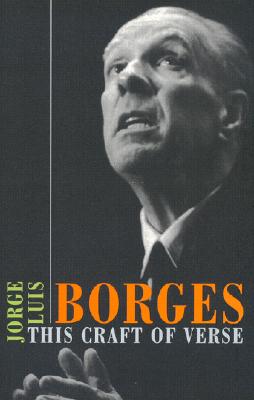 This Craft of Verse (Harvard UP, 2000), a collection of Jorge Luis Borges’s Norton Lectures, is as much a phenomenal display of the Argentine writer’s sparkling erudition as it is a glimpse of his demeanor, attitude, and manner. Lectures are often presented as arguments, but Borges, yet again diverging from conventional forms, quotes Emerson: “[A]rguments convince nobody…they convince nobody because they are presented as arguments. Then we look at them, we weigh them, we turn them over. And we decide against them.” In this way, Borges’s lectures unfold informally–without presenting arguments or straw-men to be quickly burnt up–and convincingly, as gentle provocations. The hesitations, false-starts, self-deprecating asides, and unassuming tone belie the intellectual rigor beneath these six lectures.
This Craft of Verse (Harvard UP, 2000), a collection of Jorge Luis Borges’s Norton Lectures, is as much a phenomenal display of the Argentine writer’s sparkling erudition as it is a glimpse of his demeanor, attitude, and manner. Lectures are often presented as arguments, but Borges, yet again diverging from conventional forms, quotes Emerson: “[A]rguments convince nobody…they convince nobody because they are presented as arguments. Then we look at them, we weigh them, we turn them over. And we decide against them.” In this way, Borges’s lectures unfold informally–without presenting arguments or straw-men to be quickly burnt up–and convincingly, as gentle provocations. The hesitations, false-starts, self-deprecating asides, and unassuming tone belie the intellectual rigor beneath these six lectures.
No less remarkable is that these profoundly illuminating and visionary pieces were composed at a time when Borges was nearly blind. By this time, as editor Calin-Andrei Mihailescu writes in the book’s postscript, Borges could see “nothing more than an amorphous field of yellow.” We quickly learn, however, that his mind’s eye was as sharp and discerning as ever.
***
In “The Riddle of Poetry,” Borges offers what he calls “time-honored perplexities”: in great poetry, there is no prescription, no certainty–only mystery and magic. He describes poetry as a “passion and a joy,” once again quoting Emerson, who regarded libraries as “a kind of magic cavern which is full of dead men. And those dead men can be reborn, can be brought to life when you open their pages.” Once we recover from this startling image, we realize the incredible and almost god-like power rendered to the reader, namely the power of resurrection. As Borges continues, we are slowly drawn into an ontological meditation. Books are viewed through the lens of questions like: What constitutes a book in the first place? Who invents it? Does the author; the reader? How do the properties of a book relate to a book itself? What are its essences? Borges answers:
A book is a physical object in a world of physical objects. It is a set of dead symbols. And then the right reader comes along, and the words—or rather the poetry behind the words, for the words themselves are merely symbols—spring to life and we have the resurrection of the word.
Like Borges, I have no Greek (actually in my case, my Greek is weak, or rather, bleak), but perhaps we can call this act biblionecrophilia.
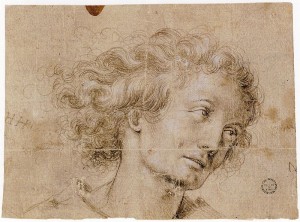
St. John the Apostle, by Hans Holbein the Younger
This act of breathing life into words reminds me of the Apostle John’s concept of “the word” or logos: “In the beginning was the Word, and the Word was with God, and the Word was God . . . And the Word was made flesh, and dwelt among us” (John 1:1, 14). Many Christians would argue against Hellenistic influence on the etymology of logos. Be that as it may, the varying concepts of logos may be found throughout ancient philosophy beginning with Heraclitus and on through the Stoics. Logos is generally translated as “word,” but also as “account,” “meaning,” “principle,” “proportion,” “reason,” “speech,” “standard,” “study,” and “thought,” and it is the root for “logic” and the “ology” suffix.
Heraclitus, a pre-Socratic philosopher, defined logos more ambiguously as a “fiery substance” and the “fundamental order of all.” Following him, was Philo Judaeus whose conception of the word logos references Plato’s “Theory of Forms” (where ideas represent the highest form of reality), and the interplay between the corporeal and the supernatural, as well as the mediation of ancestral and angelic theophanies. For Philo, logos is the ultimate source of all life. The Apostle John’s contribution is in his specific incarnation of the word. I prefer the ambiguous reference to the “word” rather than the Apostle’s corporeal interpretation. And we can thank Borges for declaring that we have the power to incarnate the word in innumerable ways and forms.

photo by ricoeurian (flickr cc)
Borges later describes a malady that I’m sure many readers suffer from—one that I myself have experienced in public libraries and bookstores. In his library, Borges looks “at the many books I have at home. I feel that I should die before I come to the end of them, yet I cannot resist the temptation of buying new books. Whenever I walk into a bookstore and find a book of one of my hobbies…I say to myself, ‘What a pity that I can’t buy that book, for I already have a copy at home.’” This overwhelming, and one may argue obsessive, love of books notwithstanding, Borges still grounds himself by asserting that “a book is really not an immortal object to be picked up and duly worshiped, but rather an occasion for beauty. And it has to be because language is shifting all the time.”
He ends this lecture with a lament of sorts: how do we come to understand something? Borges wonders whether understanding a certain something really comes from being able to define it. Instead, it may be that we can, as Borges suggests (paraphrasing Chesterton), “define something only when we know nothing about it.” He also quotes Saint Augustine as saying “What is time? If people do not ask me what time is, I know. If they ask me what it is, then I do not know.” Wittgenstein believed that time is: “Something that we know when no one asks us, but no longer know when we are supposed to give an account of it, is something that we need to remind ourselves of.” A definition may provide a kind of mooring, a common ground for communication, but it may not necessarily bring us any closer toward arriving at, or drinking from, its source.
***
Borges’s second lecture, “The Metaphor,” presents us with a dilemma: that writers are faced with only a finite number of metaphorical patterns. Borges supposes that there may be only “twelve affinities” from which to draw. He cleverly uses the number twelve as a metaphor itself, meaning a very small number. Outside of these basic patterns are forms that are used to merely astonish, and are therefore fleeting. He ends this talk, however, by encouraging writers to invent new patterns, noting that “it may also be given to us to invent metaphors that do not belong, or that do not yet belong, to accepted patterns.”
For examples, Borges draws on the works of the Argentine poet Lugones, as well as those of Chesterton, Plato, Tennyson, Manrique, and Robert Louis Stevenson, and from his beloved Beowulf. He uses Shakespeare to illuminate the metaphorical pattern of life as a dream, invoking that famous line from The Tempest: “We are the stuff / as dreams are made on, and our little life / Is rounded with a sleep.” Borges believes these words belong as much to philosophy as to poetry. Reading this, I thought of Zhuangzi’s famous dream:
Once Zhuangzi dreamt he was a butterfly, a butterfly flitting and fluttering around, happy with himself and doing as he pleased. He didn’t know he was Zhuangzi. Suddenly he woke up and there he was, solid and unmistakable Zhuangzi. But he didn’t know if he was Zhuangzi who had dreamt he was a butterfly, or a butterfly dreaming he was Zhuangzi. Between Zhuangzi and a butterfly there must be some distinction! This is called the Transformation of Things. (2, tr. Burton Watson 1968:49).

photo by spettacolopuro (flickr cc)
Borges later recalls this famous passage as well and remarks on the choice of the word “butterfly” and how the feeling of Zhuangzis’s thought would have completely fallen apart if Zhuangzi had chosen some other animal or object:
A butterfly has something delicate and evanescent about it. If we are dreams, the true way to suggest this is with a butterfly and not a tiger. If Chuang Tzu (Zhuangzi) had a dream that he was a typewriter, it would be no good at all. Or a whale—that would do him no good either. I think he has chosen just the right word for what he is trying to say.
I laughed out loud at Zhuangzi dreaming of himself as a typewriter; I was imagining those talking typewriters in Naked Lunch. But then I thought about how important the building blocks of a sentence can be, of Flaubert aching over every word, every jot and tittle, every punctuation curve, slash, and dot. Who defined poetry as “the best words in the best order?” Coleridge? That’s all there is, but it’s everything, and everything, to be redundant, is a lot.
***
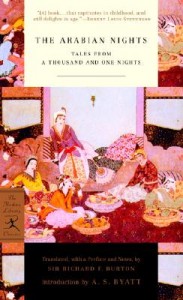 “Telling of the Tale” finds Borges whizzing through the centuries and continents discussing the epic form in literature. The supposed “death of the novel” also receives treatment here. After the autopsy, he finds that there’s still much life to storytelling and by extension, the novel itself. Plots too fall into only a few patterns. Borges asserts that The Arabian Nights and Orlando Furioso are interesting not because of any introduction of a new plot, but because of the constant shifting within the overall structure of each work.
“Telling of the Tale” finds Borges whizzing through the centuries and continents discussing the epic form in literature. The supposed “death of the novel” also receives treatment here. After the autopsy, he finds that there’s still much life to storytelling and by extension, the novel itself. Plots too fall into only a few patterns. Borges asserts that The Arabian Nights and Orlando Furioso are interesting not because of any introduction of a new plot, but because of the constant shifting within the overall structure of each work.
In this lecture, Borges famously declares that laziness kept him from writing novels. I wonder if this is the same “happy indolence” that Billy Collins has described as his modus operandi. Borges, like the ancients, defines the poet as “‘a maker’—not only as the utterer of those high lyric notes, but also as a teller of a tale. A tale wherein all the voices of mankind might be found—not only the lyric, the wistful, the melancholy, but also the voices of courage and of hope.” And he finds the greatest expression of this in the epic. He begins his discussion with The Iliad and The Odyssey. Providing the template for countless tales, these two stories still have some unturned stones. The Iliad may in fact be the story of an army who fight knowing they will be defeated, that the true heroes of the tale are not the Greeks, but the Trojans. The Odyssey is both the tale of a homecoming and the tale of adventure which Borges calls “perhaps the finest that has ever been written or sung.” And we all know how James Joyce, not to mention Derek Walcott, felt about it.
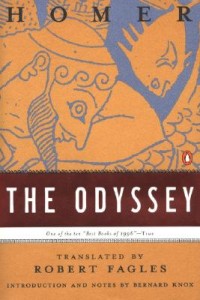
Surprisingly, Borges asserts that the Gospels supersede even these two masterworks. While Christians understand Jesus’ story to be one of a perfect man-god condescending to become the bridge–the mediator between God and man–Borges finds another story, one he discovered in Langland’s The Vision of Piers the Plowman; namely, this is “the idea that God wanted to know all about human suffering, and that it was not enough for Him to know it intellectually, as a god might; he wanted to suffer as a man, and with the limitations of a man.” Is God here practicing a kind of sadomasochism? Borges goes on to say, “However, if you are an unbeliever (many of us are) then you can read the story in a different way. You can think of a man of genius, of a man who thought he was a god and who at the end found out that he was merely a man, and that god—his god—had forsaken him.” The idea of Jesus as a genius gone mad seems familiar to me already. However, I think my understanding of the story of the Gospels is indebted to Joseph Campbell’s The Hero with a Thousand Faces, that is, of Christ belonging to a pantheon of figures that include Osiris, Dionysus, Tammuz, Horus, and Mithras.
Borges ends the lecture declaring that great things will happen if first the “telling of the tale and the singing of the verse” come together again, and when “the pleasure of being told a story” is wedded with “the additional pleasure of the dignity of verse, where the characters, motivations, feelings of the protagonists, rather than simply their circumstances, are “intimately” known.
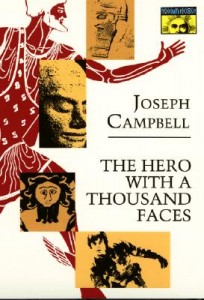
***
The most interesting part of “Word Music and Translation”—reflections on the pains and joys, perils and pearls of translation—is not Borges’s thoughts on translation, as it were. While these are illuminating, it’s his discussion of the magic of words, “of sense and sound in poetry” that I find most engaging. I don’t think I fall into either of the two camps described by Borges in regards to translation. I enjoy a literal word-for-word translation as much as those that take creative license and leaps, where the translation attempts to achieve the grandeur of the original, becoming a work of art in its own right. We should allow translations the same room for interpretation as musicians, poets, artists, filmmakers, etc., those who have been inspired by a literary work to realize their own work of art. Borges states that a poet should be allowed to “read a work and then somehow evolv[e] that work from himself, from his own might, from the possibilities hitherto known of his language.” I also think it’s impossible for any work to have a definitive translation. A translation will always be a rather than the translation. (I wonder if even an autobiography must be prefaced with the indefinite article “an.”) Borges’s belief that translation is a means of creative evolution is a provocative and stimulating idea, and serves as a challenge to potential translators.
Throughout his examinations of poems, Borges is overwhelmed by the incantatory power of words, they bubble over irresistibly without end. A poem here is “filled with a fierce, ruthless joy,” and another there emerges “out of deep emotion. We have to think of it as an onrush of great verse.” One poet reaches “the highest experience of which the soul of man is capable—the experience of ecstasies…” One can only marvel at how these vast deposits of words can continue to build mountains in the mind even after biological vision is lost.
***
“Thought and Poetry” finds Borges asserting over and over again that metaphors should both resonate and unsettle. He describes the battle between magic and reason: it is magic and its sister, music, that must always prevail. While still ambivalent about poetry’s magic, Borges states: “For the materials of poetry are words, and those words are…the very dialect of life. Words are used for humdrum purposes and are the material of the poet, even as sounds are the material of the musician.” And, once again echoing Stevenson, he says the “poet is able to weave those rigid symbols meant for everyday or abstract purposes into a pattern which he calls ‘the web’…words being made by literature to serve for something beyond their intended use. Words… meant for the common everyday commerce of life, and the poet somehow makes of them something magic.”
Borges lists two ways of writing a poem. One may use common words to wring out from them the uncommon, “to evolve magic from them.” This “wringing” brings to mind a trip I took to the River Ganges in Varanasi, where I watched people squeeze their colorful and sopping wet laundry, then smack it against the ghats (the stone steps lining the sacred river) to remove every single drop of water. The other way to write a poem is to use elaborate means to express the common. And while the poetry of Góngora, Donne, Yeats, and Joyce may be described as “far-fetched” with “strange things in them,” we still discover the emotions behind them burn like the blaze of a summer afternoon. But Borges, not without a hint of annoyance, says that neither of these approaches matter as regards their worth. What does matter is whether the poetry is alive or dead.
***
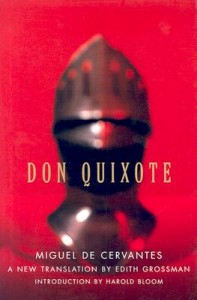 The final lecture, “A Poet’s Creed,” begins with the promise of finally hearing Borges’s own ars poetica but actually unspools into a celebration of what he has read, especially the books having the most profound impact on him, his life, and his life as a reader and writer. He relates the story of his father reading aloud Keats’ “Ode to a Nightingale.” This image has lived with him a span of over six decades. Borges continues to survey his formative years as a reader. Huckleberry Finn, Don Quixote, The Hound of Baskervilles, Leaves of Grass, the Norse sagas, Old English poetry, Moby Dick, and Pilgrim’s Progress all receive treatment here.
The final lecture, “A Poet’s Creed,” begins with the promise of finally hearing Borges’s own ars poetica but actually unspools into a celebration of what he has read, especially the books having the most profound impact on him, his life, and his life as a reader and writer. He relates the story of his father reading aloud Keats’ “Ode to a Nightingale.” This image has lived with him a span of over six decades. Borges continues to survey his formative years as a reader. Huckleberry Finn, Don Quixote, The Hound of Baskervilles, Leaves of Grass, the Norse sagas, Old English poetry, Moby Dick, and Pilgrim’s Progress all receive treatment here.
Speaking self-deprecatingly of his youth, Borges describes himself as a
17th Century writer with a certain knowledge of Latin…out for the purple patches. Now I think that the purple patches are a mistake because they are a sign of vanity, and the reader thinks of them as a sign of vanity. If the reader thinks that you have a moral defect, there is no reason whatever why he should admire you or put up with you.
This is useful advice for writers of any age and experience. Alas, this pruning seems an endless process.
Borges continues to describe the daunting and almost impossible work of a writer:
If I have attained the happiness of writing four or five tolerable pages after writing fifteen intolerable volumes, I have come to that feat not only through many years but also through the method of trial and error. I think that I have not committed all the possible mistakes—because they are innumerable—but many of them.
Borges’s humility should be admired but what must also be considered here is the incredible challenge—one may even describe it as a daunting, accusing mountain—that faces the writer. Those “tolerable” pages arrive from labored and conscientious output, through the uncertain process of trial and error, and through the making of, the awareness and recognition of, as well as the correction and ultimate learning from, mistakes.
This lecture finds Borges at his most prescriptive and there is much here for the writer to glean from. For instance:
I think I have come not to a certain wisdom but perhaps to a certain sense. I think of myself as a writer. What does being a writer mean to me? It means simply being true to my imagination. When I write something, I think of it not as being factually true (mere fact is a web of circumstances and accidents), but as being true to something deeper. When I write a story, I write it because somehow I believe in it—not as one believes in mere history, but rather as one believes in a dream or idea.
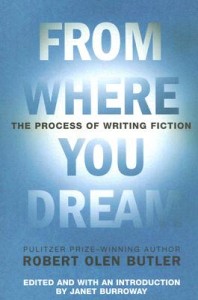 This passage reminds me of Robert Olen Butler’s book, From Where You Dream: The Process of Writing Fiction. Butler privileges the notion that it is from a deep yearning, from motivation’s tug-of-war, or what he calls the “dreamspace,” that significant works of art, to say nothing of one’s spiritual growth, are derived.
This passage reminds me of Robert Olen Butler’s book, From Where You Dream: The Process of Writing Fiction. Butler privileges the notion that it is from a deep yearning, from motivation’s tug-of-war, or what he calls the “dreamspace,” that significant works of art, to say nothing of one’s spiritual growth, are derived.
***
Borges concludes with a timid hope: “Sometimes I am courageous and hopeful enough to think that it may be true—that though all men write in time, are involved in circumstances and accidents and failures of time, somehow things of beauty may be achieved. When I write, I try to be loyal to the dream and not to the circumstances.” What a precious thing we have here–an elusive possibility at best, but still in the end rewarding–that through loyalty to the vision, through faith in its truth and power, we may sometimes find beauty.
Reading these lectures, I am left with the charge to surrender myself to the dream, its vast landscape, its ebb and flow, its eddying currents, its whirlpool and undertow even; to recognize that the very root of words is magic, that the pleasure of a well-told story should be fused with poetry’s dignity; to find common words to express uncommon ideas, as well as to explore its inverse; to weed out the purples patches from the pages’ white fields; and lastly, to not take vision–biological and mental, or that of any other senses, including the non-physiological– for granted.
About the Author
 John Madera‘s work can be found in Featherproof Press, elimae, Everyday Genius, ArtVoice, Underground Voices, Little White Poetry Journal #7, and hitherandthithering waters, and he reviews for Bookslut, The Collagist, The Diagram, The Quarterly Conversation, 3:AM Magazine, New Pages, Open Letters Monthly, The Rumpus, Tarpaulin Sky, and Word Riot. His fiction is forthcoming in Opium Magazine and Corduroy Mountain. An essay will appear in The Prairie Journal: A Magazine of Canadian Literature. He is editing a collection of essays on the craft of writing for Publishing Genius Press (2010). He edits the forum Big Other and journal The Chapbook Review. He is an Assistant Fiction Editor for Identity Theory. He sings and plays guitar for Mother Flux. He is a member of the National Book Critics Circle.
John Madera‘s work can be found in Featherproof Press, elimae, Everyday Genius, ArtVoice, Underground Voices, Little White Poetry Journal #7, and hitherandthithering waters, and he reviews for Bookslut, The Collagist, The Diagram, The Quarterly Conversation, 3:AM Magazine, New Pages, Open Letters Monthly, The Rumpus, Tarpaulin Sky, and Word Riot. His fiction is forthcoming in Opium Magazine and Corduroy Mountain. An essay will appear in The Prairie Journal: A Magazine of Canadian Literature. He is editing a collection of essays on the craft of writing for Publishing Genius Press (2010). He edits the forum Big Other and journal The Chapbook Review. He is an Assistant Fiction Editor for Identity Theory. He sings and plays guitar for Mother Flux. He is a member of the National Book Critics Circle.





